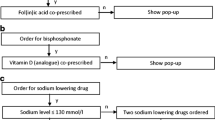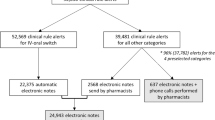Abstract
Background In advanced clinical decision support systems, patient characteristics and laboratory values are included in the algorithms that generate alerts. These alerts have a higher specificity than basic medication surveillance alerts. The alerts of advanced clinical decision support systems can be shown directly to the prescriber during order entry, without the risk of generating an overload of irrelevant alerts. We implemented five advanced algorithms that are shown directly to the prescriber. These algorithms are for gastrointestinal prophylaxis, folic or folinic acid prescribed with orally or subcutaneously administered methotrexate, vitamin D prescribed with bisphosphonates, hyponatremia and measuring plasma levels for vancomycin and gentamicin. Objective We evaluated the effect of the implementation of the algorithms. Setting We performed prospective intervention studies with a historical group for comparison in both inpatients and outpatients at a teaching hospital in the Netherlands. Methods We compared the time period after implementation of the algorithm with the time period before implementation, using data from the hospital information system Epic. Difference in guideline adherence were analyzed using Chi square tests. Main outcome measure The outcome measures were the number of alerts, the acceptance rate of the advice in the alert, and for the algorithm measuring plasma levels for vancomycin and gentamicin the time to the correct dose. Results For all algorithms, the implementation resulted in a significant increase in guideline adherence, varying from 11 to 36%. The acceptance rate varied from 14% for hyponatremia to 90% for methotrexate. For gastrointestinal prophylaxis the acceptance rate was 4.4% for basic drug–drug interaction alerts when no gastrointestinal prophylaxis was prescribed and increased to 44.7% after implementation of the advanced algorithm. This algorithm substantially decreased the number of alerts from 812 before implementation to 217 after implementation. After implementation of the algorithm for measuring plasma levels for vancomycin and gentamicin, the proportion of patients receiving the correct dose after 48 h increased from 73 to 84% (p = 0.03). Conclusion Implementation of advanced algorithms that take patient characteristics into account and are shown directly to the physician during order entry, result in an increased guideline adherence.

Similar content being viewed by others
References
Wolfstadt JI, Gurwitz JH, Field TS, Lee M, Kalkar S, Wu W, et al. The effect of computerized physician order entry with clinical decision support on the rates of adverse drug events: a systematic review. J Gen Intern Med. 2008;23(4):451–8.
Beijer HJ, de Blaey CJ. Hospitalisations caused by adverse drug reactions (ADR): a meta-analysis of observational studies. Pharm World Sci. 2002;24(2):46–54.
van der Sijs H, Mulder A, van Gelder T, Aarts J, Berg M, Vulto A. Drug safety alert generation and overriding in a large Dutch university medical centre. Pharmacoepidemiol Drug Saf. 2009;18(10):941–7.
Wasylewicz ATM, Scheepers-Hoeks AMJW. In: Kubben P, Dumontier M, Dekker A, editors. Clinical Decision Support Systems. Fundamentals of Clinical Data Science [Internet]. Cham (CH): Springer; 2019. Chapter 11. 2018 Dec 22.
Lilih S, Pereboom M, van der Hoeven RT, Mantel-Teeuwisse AK, Becker ML. Improving the effectiveness of drug safety alerts to increase adherence to the guideline for gastrointestinal prophylaxis. Int J Med Inform. 2017;97:139–44.
Baypinar F, Kingma HJ, van der Hoeven RTM, Becker ML. Physicians’ compliance with a clinical decision support system alerting during the prescribing process. J Med Syst. 2017;41(6):96.
Pereboom M, Mulder IJ, Verweij SL, van der Hoeven RTM, Becker ML. A clinical decision support system to improve adequate dosing of gentamicin and vancomycin. Int J Med Inform. 2019;124:1–5.
Wasylewicz ATM, Korsten EHM, Egberts TCG, Grouls RJE. Clinical rule-guided pharmacists’ intervention in hospitalized patients with hypokalaemia: A time series analysis. J Clin Pharm Ther. Epub 2019 Dec 24.
Choi KS, Lee E, Rhie SJ. Impact of pharmacists’ interventions on physicians’ decision of a knowledge-based renal dosage adjustment system. Int J Clin Pharm. 2019;41(2):424–33.
Rommers MK, Zwaveling J, Guchelaar HJ, Teepe-Twiss IM. Evaluation of rule effectiveness and positive predictive value of clinical rules in a Dutch clinical decision support system in daily hospital pharmacy practice. Artif Intell Med. 2013;59(1):15–21.
Kawamoto K, Houlihan CA, Balas EA, Lobach DF. Improving clinical practice using clinical decision support systems: a systematic review of trials to identify features critical to success. BMJ. 2005;330(7494):765.
HARM-Wrestling, Recommendations of the Dutch HARM-Wrestling Task Force for Targeting Outpatient Drug Safety, Ministry of Health, Welfare and Sport, The Hague, 2009.
Dutch Association of Hospital Pharmacists. Therapeutic Drug Monitoring Monograph Gentamicin [In Dutch]. 2015. Version 07-2015 http://tdm-monografie.org/. Accessed 24 June 2016.
Dutch Association of Hospital Pharmacists. Therapeutic Drug Monitoring Monograph Vancomycin [In Dutch]. 2014. Version 05-2014 http://tdm-monografie.org/. Accessed 24 June 2016.
Fichman MP, Vorherr H, Kleeman CR, Telfer N. Diuretic-induced hyponatremia. Ann Intern Med. 1971;75(6):853–63.
Scheepers-Hoeks AM, Grouls RJ, Neef C, Ackerman EW, Korsten EH. Physicians’ responses to clinical decision support on an intensive care unit–comparison of four different alerting methods. Artif Intell Med. 2013;59(1):33–8.
Acknowledgements
Not applicable.
Funding
No funding was received in relation to this study.
Author information
Authors and Affiliations
Corresponding author
Ethics declarations
Conflicts of interest
The authors declare no conflict of interest.
Additional information
Publisher's Note
Springer Nature remains neutral with regard to jurisdictional claims in published maps and institutional affiliations.
Rights and permissions
About this article
Cite this article
Becker, M.L., Baypinar, F., Pereboom, M. et al. The effect of medication related clinical decision support at the time of physician order entry. Int J Clin Pharm 43, 137–143 (2021). https://doi.org/10.1007/s11096-020-01121-1
Received:
Accepted:
Published:
Issue Date:
DOI: https://doi.org/10.1007/s11096-020-01121-1




